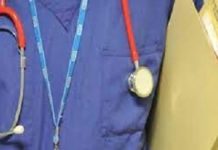
Resident doctors at the Chukwuemeka Odumegwu Ojukwu University Teaching Hospital (COOUTH), Awka, have called on governments at all levels to take deliberate steps to address the plague of brain drain in the medical service delivery.
The doctors made the call at the first Annual General Meeting and academic conference of Association of Resident Doctors (ARD), COOUTH branch in Awka, at the weekend.
The theme of the AGM and academic conference was “Brain drain and the residency training programme, striking a balance”.
Dr Nnaemeka Añunihu, the President of ARD, COOUTH, said the effect of brain drain was biting hard on the sector.
Añunihu said that although the menace of brain drain was a third-world phenomena, it had assumed an unacceptable dimension in Nigeria.
He said government should find out why practicing outside the country continued to be more attractive to doctors and other health professionals trained in Nigeria than practicing at home.
“There are a number of factors influencing the exodus of doctors, including the push and the pull factors, wages, facilities, security and value for earned wages. Brain drain is a serious loss to us as a country because Nigerian doctors are some of the best across the world, so why would we not want to keep them here,” he said.
Añunihu said the Residency programme at COOUTH was not without the challenge of the programme elsewhere even though the institution was state owned.
He called for the domestication of the Medical Residency Training Act which would create an air of certainty and encourage doctors to undergo training with the confidence that their fate were protected by law.
Also speaking, Dr Princeton Okam, a consultant obstetrician at the Nnamdi Azikiwe University Teaching Hospital, Nnewi, said brain drain was a plague bewitching the medical profession.
Okam, who is the Vice Chairman of Nigeria Medical Association, Anambra Branch, said the conversation on brain drain would continue to be in the front burner until the tide was checked.
He said while the government had a big role to play, doctors should begin to think about how they could assist in addressing the problem.
According to him, “It is not a bed of roses anywhere. but there must be jobs after training. If better facilities are put in place; if remuneration is made competitive, I don’t think anybody will like to leave this country to practice elsewhere. Truth is that those who wish to come back don’t have a place here because they have been displaced. They are trapped there. They have better training but we can’t benefit from the brain gain. So, the advice is that our young doctors should think deeply before making such a decision,” he said.
Declaring the event open, Dr Josephat Akabuike, chief medical director of COOUTH, commended the resident doctors for their dedication and contributions to effective healthcare service delivery at the institution.
Akabuike assured that he would continue to improve on the welfare of staff as well as support them for better productivity.
He, however, cautioned doctors against transferring aggression to patients while charging them to be focused and prioritise the wellbeing of the patients at all times.
He said the primary objective of the health institution was to save lives no matter the challenges confronting them or the environment they found themselves in.
In his lecture, Dr Nnaemka Umedum described brain drain as emigration of highly-skilled medical personnel from poor or middle income countries to more developed countries.
Umedum identified lack of opportunities for advanced medical training, underfunded health care systems, poor remuneration, poor socioeconomic and political conditions, as some of the major causes of brain drain in developing countries.
“Loss of valuable human resources, slowing down of economic growth, lack of innovation and creativity, are some of the negative effects of brain drain on the country involved. Resident Doctors and other health professionals should resist the temptation to emigrate by seeking opportunities to gain additional training and experience in their home country,” he added.
NAN











